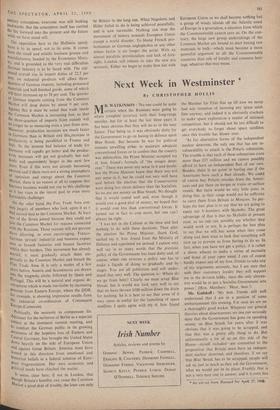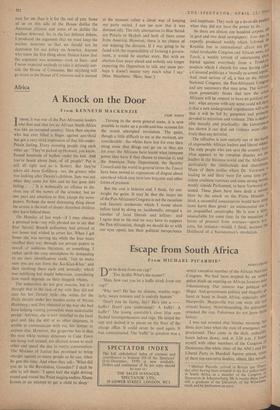Next Week in Westminster *
By CHRISTOPHER HOLLIS
MR. WATKINSON : `No one could be quite certain when the Russians were going to attain complete accuracy with their long-range missiles, but for at least the last three years it has been obvious that they will do so in the near future. That being so, it was obviously dotty for the Government to go on basing its defence upon Blue Streak. But because he was for political reasons unwilling either to maintain adequate conventional forces or to confess that the country was defenceless, the Prime Minister accepted my rt. hon. friend's formula of "the unique deter- rent." There was never any sense in it and doubt- less the Prime Minister knew that there was not any sense in it, but he could not very well have said before the election that the Conservatives were doing less about defence than the Socialists. So we put our money on Blue Streak. We thought that it would sound well and, even though it would cost a good deal of money, we hoped that it would cost less than conventional forces. It turned out in fact to cost more, but one can't always be right.
`I was not in the Cabinet at the time and had nothing to do with these decisions. Then after the election the Prime Minister, thank God, sacked my rt. hon. friend from the Ministry of Defence and appointed me instead. I cannot very well say in so many words that the previoUs policy of the Government has been dotty and, of course, when one reverses a policy one has to make a facade of doing so gradually and by stages. You are all politicians and will under- stand that very well. The question is: Where do we go from here? Clearly we must scrap Blue Streak, but it would not look very well to say that we have thrown £100 million down the drain for nothing. So it is best to say that some of it may come in, useful for the launching of space satellites. I quite agree with my rt. hon. friend the Member for Flint that up till now we never had any intention of launcing any space satel- lites anyway, and indeed it is obviously crackers to make space exploration a matter of national competition. but it should not be too difficult to get everybody to forget about space satellites once this trouble has blown over.
`As for alternative forms of the independent nuclear deterrent, the only one that has any in- vulnerability to attack is the Polaris submarine. The trouble is that each of these submarines costs more than £35 million and we cannot possibly afford to have an independent fleet of our own. • Besides, there is no point in having one if the Americans have such a fleet already. We could of course buy Polaris missiles from the Ameri- cans and put them on barges or trains or surface vessels. But there would be very little point in doing that, as their range would not be sufficient to carry them from Britain to Moscow. So per- haps the best plan is to say that we are going to equip our V-bombers with Skybolts. The great advantage of that is that no Skybolts at present exist, so no one can possibly say whether they would work or not. It is perhaps the best plan to say that we will_ buy some when they come along and then trust to luck that something will turn up to prevent us from having to do so. In fact. when you have not gbt a policy, it is rather a clever wheeze to make a virtue of necessity and boast of your open mind. I can of course hardly expect any of my hon. friends to take any of my arguments seriously, but I am sure that with their customary loyalty they will support me in the division lobby, since the only alterna- tive would be to put a Socialist Government into power.' (Hon. Members: 'Hear, hear.') Mr. Gnitskell : 'My hon. friends will well understand that I am in a position of some embarrassment this evening, For once we are on a thoroughly good wicket. Whatever our general theories about disarmament, no one can seriously deny that the Government has gone on spending money on Blue Streak for years after it was obvious that it was going to be scrapped, and that that was a pretty silly thing to do. But unfortunately a lot of us on this side of the House—myself included—are committed to the proposition that Britain must have an indepen- dent nuclear deterrent, and therefore, if we say that Blue Streak has to be scrapped, people will ask us. just as much as they ask the Government, what we would put in its place. Frankly that is not a very easy one to answer, and it is even less * An ext,lct from Hansard for April 27, 1960 easy for me than it is for the rest of you. Some of us on this side of the House dislike the American alliance and some of us dislike the nuclear deterrent. So, in the last defence debate, I produced the argument that we must keep the nuclear deterrent so that we should not be dependent for our policy on America. Anyone who knew the first thing about finance knew that the argument was nonsense—look at Suez—and I never expected anybody to take it seriously out- side the House of Commons, But anything will go down in the House of Commons and it seemed at the moment rather a clever way of keeping my party united. I can see now that it was damned silly. The only alternatives to Blue Streak are Polaris or Skybolt and both of them come from America. However, there is no chance of our winning the division. If I was going to be faced with the responsibility of forming a govern- ment, it would be another story. But with an election four years ahead and nobody any longer expecting the Opposition to talk any sense per- haps it doesn't matter very much what I say.' (Hon. Members: 'Hear, hear.')











































 Previous page
Previous page